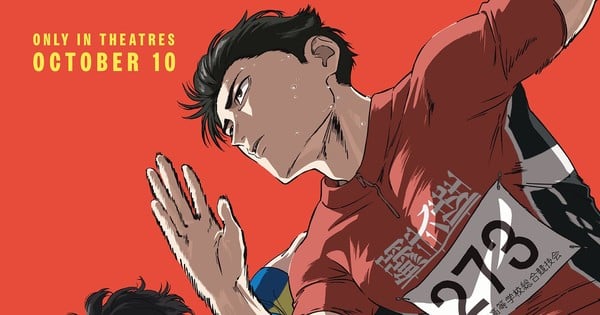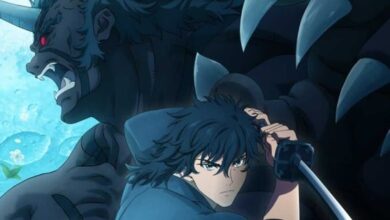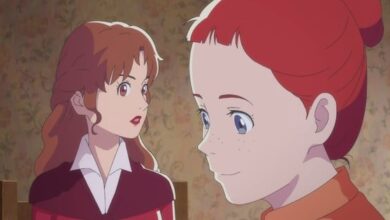100 Meters Anime Film Review – Review

“Wow, the main character does look like Rafael from Rafael.” Orb: On the Movement of the Earth“, I thought during this period 100 metersIn the opening minutes, young protagonist Togashi coaches his classmate Komiya Dash. It turns out that the director of this movie is Music: our soundof Iwasawa Kenjiadapted from comics Orbof vegetation. Since its initial release in 2018, 100 meters“The five-volume comic is vegetationA major breakthrough in publishing, it tells the story of two athletes’ careers from elementary school through their mid-twenties. Far from this OrbWell-researched, dark, dramatic historical drama. There is an intensity 100 meters and its characters really feel like they fit together. OrbHowever, they helped make this film a magnetic one and I was stunned the entire time.
Without a doubt, the best sports anime movie in recent years is Takehiko Inoueof first dunkwhose outstanding basketball game is visualized using advanced motion rendering technology. rotoscoping can be divisive, especially among anime fans—just look at the incredibly mixed reactions in 2013 flower of evilbut there is no dispute first dunk – that film used its technology to its greatest success. 100 Meter’s Iwasawa is no stranger to the use of rotoscoping – his previous work, musica teleportation film based on his self-published manga and animated by amateurs. Iwasawa took the success of that film and assembled a larger team of professionals, translating it perfectly into the competitive world of professional track and field.
The way characters move combines anime style with a grounded, naturalistic look 100 meters This manages to avoid the uncanny valley effect that sometimes plagues rotoscoping animation. Especially in the running scenes, there’s a profound sense of weight, sheer muscle-ripping, teeth-grinding effort. they remind people Takeshi Koikeof animator short world recordas runners nearly transcend reality in just a few seconds as they chase almost superhuman record times.
If there’s a theme to this movie, it’s “Why did you run away?” and each character’s answer is very different, and sometimes, when they lose sight of that, they fail. While some characters view each other as mortal enemies, in the end, they are fighting against themselves. I particularly enjoyed the older runner Jae-jin, who lectures the younger students at school and gives hilarious, utterly nihilistic advice that scares the teachers away. The thing is, it actually helps supporting character Komiya overcome his deep-seated anxieties and drives him to success, though maybe not in the healthiest way…
We know very little about the characters’ lives beyond their love for the songs. The protagonist Togashi is a quiet, enthusiastic young man who cares about others and is initially confident in his abilities but wary of the fame he gained early in life. We see him struggle with a crisis of confidence, including a particularly brutal scene in which he breaks down crying in front of a pair of utterly confused children, large drops of tears and snot dripping onto the concrete at his feet. We have no doubt about the value running has brought to his life, and it is heartbreaking that his future could be taken away from him through injury.
Xiao Gong is more like a mystery, a young man who looks like a haunted man, more like a death NoteL, with dark eye shadow and an awkward personality. As the story spans the years and the characters physically change and grow, it can be a little difficult to tell who is who. More than once I confused one character with another in several scenes before being able to confidently identify them accurately. I wonder if the source material had to be heavily edited to fit the entire five volumes into the space of one film? Unfortunately, the comic is not currently legally available in English, so I couldn’t check it out.
By far the most impressive scene occurred during a sports final in heavy rain. Consisting of one long shot shot on location, but frame by frame, backgrounds and everything so carefully drawn, it’s a spine-tingling experience packed with action that has a certain roughness and brutal physicality. At the end, Togashi stands alone in disbelief, his figure disappearing into the pouring rain, a powerful image. I shudder to think of the amount of work that must have gone into completing this scene.
Detailed backgrounds have a painterly look, with all-natural, near-realistic colors. Other slow-motion shots look softer, and some clever scene transitions, such as a time jump during a run, are striking. The excellent soundtrack significantly enhances the overall atmosphere, and I particularly enjoyed the urgent and upbeat ending theme lahisa go through Official HiGE DAdismwhich perfectly fits the tone and subject matter of the movie.
My favorite character is Kaido, who we meet later in the movie as an adult athlete. His mirror hoods never come off and his full beard makes him look much older than his other competitors. His characterization is enhanced immeasurably voice actor Kenjiro Tsudawho Orb Fans will recognize this as the voice of the fearsome Inquisitor Novak. His deep drawl of lines was a perfect fit for Kaido, and I loved his role in the story.
At first glance, 100 metersThe seemingly ambiguous ending may seem a bit disappointing to viewers eager to know which protagonist ultimately “wins,” but that misses the point of the story. As they each grapple with their own motivations and those of their rivals, the ultimate answer to their candidacy is not to win but to “give us our absolute all and we need nothing else.” It’s a profound look at the psychology of an athlete and a rebuttal to the constant drive to win at all costs and grind your opponents into dust. This mentality is proven to be harmful and unhealthy. Yes, winning is great, but what else can be asked of a person other than giving his or her best effort? Director Iwasaki clearly spent a lot of time and effort making this excellent film, and he should be proud of his best work to date.




